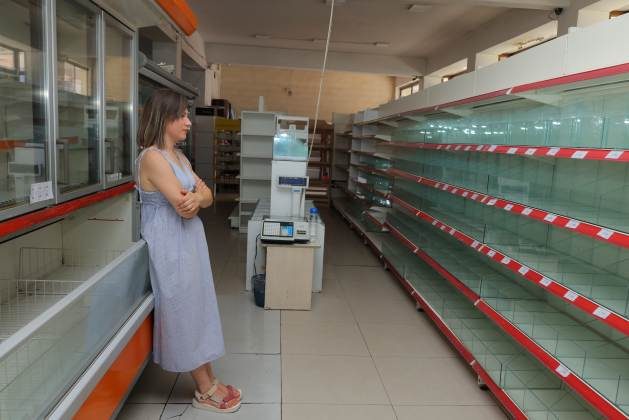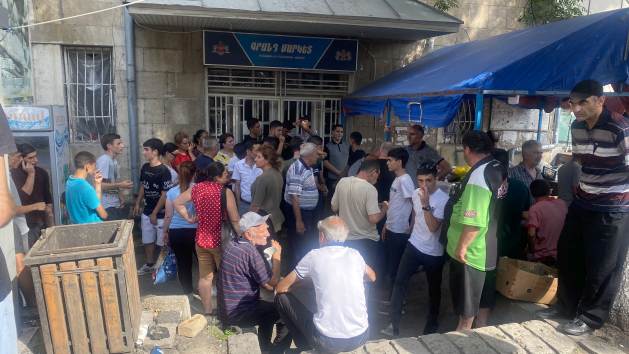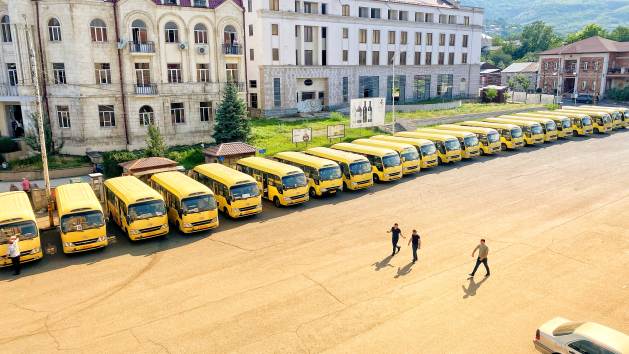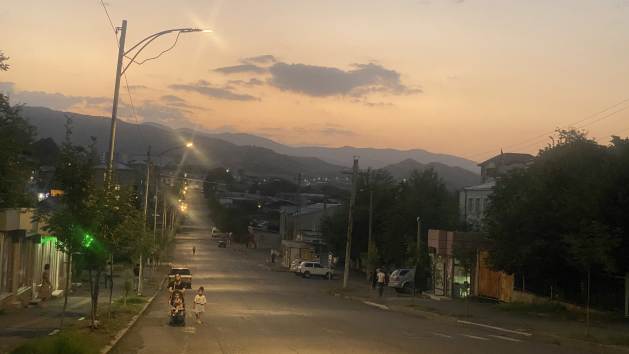Blockade in Nagorno-Karabakh: When Bread and Sanitary Pads Become Luxury Items

STEPANAKERT, Nagorno-Karabakh, Aug 08 (IPS) - Tatev Azizyan, a 28-year-old journalist from Nagorno-Karabakh, says she has explained to her child that they both have to switch to “energy save mode” to survive.
“Some bread and slices of tomato and cucumber, that's all I can give my seven-year-old daughter for breakfast. Dairy products like sugar or eggs are long gone from our table,” Azizyan told IPS from her residence in Stepanakert, the provincial capital of Nagorno Karabakh.
Saving energy is far from easy when public transport hasn’t been working for weeks, because of fuel. Queues under the scorching sun also pose dangers.
“We often see the elderly and people with disabilities faint after spending hours in line just to get a kilogram of potatoes, or when mothers take their kids to a hospital on their arms,” stressed Azizyan.
She is among 120,000 Armenians currently under blockade in Nagorno-Karabakh. Also called Artsakh by its Armenian population, it's a self-proclaimed republic within Azerbaijan which seeks international recognition and independence.
On December 12, 2022, a group of government-backed protesters identifying themselves as ‘eco-activists’ closed the Lachin corridor, the only road connecting the enclave with Armenia and the outside world with a demand to stop gold mining in the region.
Although mining was stopped two weeks later, the road remained closed. In April 2023 the eco-activists were replaced by Azerbaijani troops as Baku unilaterally installed a checkpoint in the only road.
In a statement released on July 25, the International Committee of the Red Cross -the only international humanitarian organisation operating in Nagorno-Karabakh- denounced civilians in Nagorno Karabakh population are facing “a lack of life-saving medication and essentials like hygiene products and baby formula.”
“Despite persistent efforts, the International Committee of the Red Cross (ICRC) is not currently able to bring humanitarian assistance to the civilian population,” claimed the report.

Newborns at risk
Over the last three decades, the conflict between Armenia and Azerbaijan has resulted in nearly complete ethnic separation of the population. Hundreds of thousands of people from both sides have become refugees.
Russian peacekeepers were deployed in the region after a Moscow-brokered ceasefire ended a six-week war in the fall of 2020. The Azerbaijani side has prevented peacekeepers from passing through the corridor since June 15.
The U.S., the EU, Russia, the UK, and several European countries have called on Azerbaijan to open the Lachin Corridor for humanitarian and civilian traffic.
In December 2022, Armenia brought Azerbaijan to the International Court of Justice and the European Court of Human Rights. Although both courts ordered Baku to end the roadblock and ensure unimpeded traffic along the corridor, the lifeline remains closed.
Baku had proposed an alternative route across Azerbaijani territory, an offer declined by Nagorno-Karabakh Armenians, who said it was too dangerous.
On July 26, the EU’s High Representative of the Union for Foreign Affairs and Security Policy Josep Borrell said supplies through Azerbaijan should not be seen as an alternative to the reopening of the Lachin corridor. This approach was stressed by the US Secretary of State, Anthony Blinken, during his last call with Azerbaijan’s President Ilham Aliyev.
Meanwhile, the situation inside the enclave worsens by the day.
“The number of miscarriages has increased due to a lack of medicines, stress and an unbalanced diet. Both mothers and babies are at increased risk,” Vardges Osipov, the executive director of the Maternity and Child Health Care Center in Stepanakert told IPS.
“In July alone, the number of miscarriages has increased almost three times,” the doctor warned.

Alyona Grigoryan a mother of two and pregnant with her third child is fully aware of the dangers. After facing problems with pregnancy, she was monitored by doctors at Stepanakert´s hospital for a month and a half.
She says the fetus is safe, but she needs a balanced diet, vitamins and medicines which are impossible to find.
“My 3-year-old child had a fever days ago and since we couldn't find medicines, ee had to resort to traditional means to bring down the fever with cold soaks,” the Armenian told IPS.
Grigoryan points to “additional challenges” when it comes to pregnancy, but she is also concerned about the mental health of her two kids.
“At just three and six years of age, they already know what war and a blockade are,” she lamented.
The acute shortage of individual hygiene products also poses a new danger to women in the besieged enclave.
International health organisations such as the United Nations Population Fund warn that restricting safe and affordable sanitary materials has contributed to health problems including depression, infections and other health risks.
However, in a traditional society like Nagorno-Karabakh, issues related to women's reproductive and sexual health are not discussed in public, because they are deemed shameful.
Only a few of the women interviewed by IPS mentioned their right to manage their periods with dignity. None of them mentioned the lack of birth control pills or other items used to prevent sexually transmitted diseases.

No end in sight
On July 26, the Armenian government sent 400 tons of aid to Armenians in Nagorno-Karabakh. Armenian officials expressed hope that Russian peacekeepers would escort the relief supplies.
But the convoy was blocked after Azerbaijan’s Foreign Ministry labelled the aid convoy a “provocation” and “an attack on Azerbaijan’s territorial integrity”
“Azerbaijan is trying to oppress us by forcing us to subjugate or leave our homeland, by depriving our people of humanitarian supplies and deliberately disrupting vital infrastructures. These are crimes that should be punished by the international community,” Gegham Stepanyan, Nagorno Karabakh ombudsman, told IPS from his office in Stepanakert.
Water outages, power and gas cuts are also a common currency in the enclave. The region’s vital infrastructure is fed by Armenia but all lines to the enclave pass through Azerbaijani-controlled territories. It’s up to Baku to open and down the valve of these vital supplies.
“My life is adjusted to a rolling blackouts schedule,” Luiza Sargsyan, 16, told IPS. The teenager has to look after her 10-year-old brother Levon after both were left alone in Stepanakert.
Luiza’s mother had to get surgery in Yerevan (Armenia´s capital) before the road was closed, and her father had to accompany her to provide care. Both parents are still in Goris -an Armenian town near the blocked road to Nagorno Karabakh- until they can finally go back home.
When that will be possible is still impossible to predict.
“I don´t even dare to say if classes will resume in September…,” admits this Armenian teenager. She´s blunt about the future.
“Coping with the blockade sucks all our energy now. It's a daily challenge.”
© Inter Press Service (2023) — All Rights Reserved. Original source: Inter Press Service
 Global Issues
Global Issues